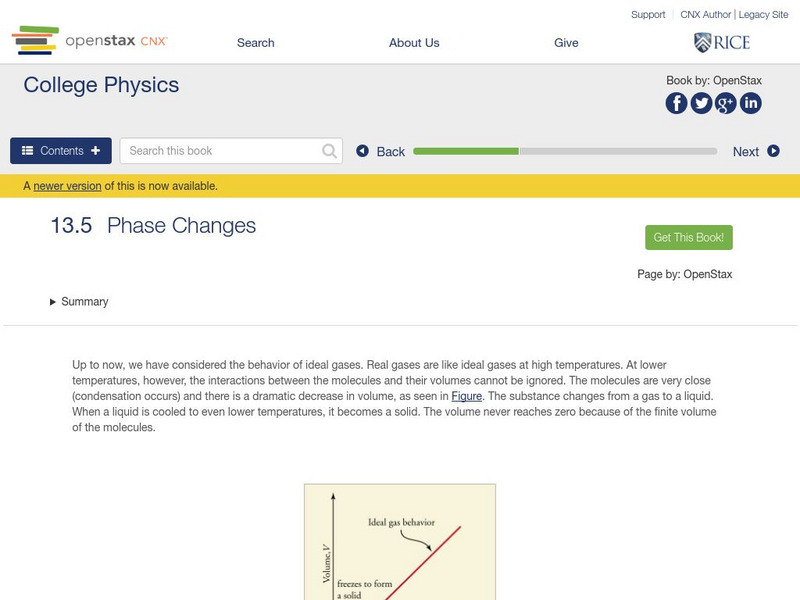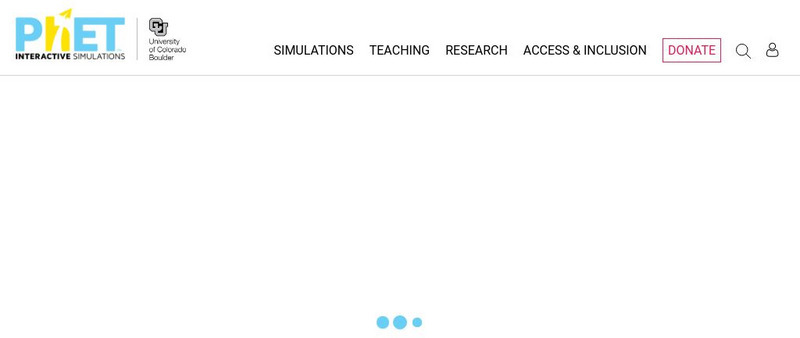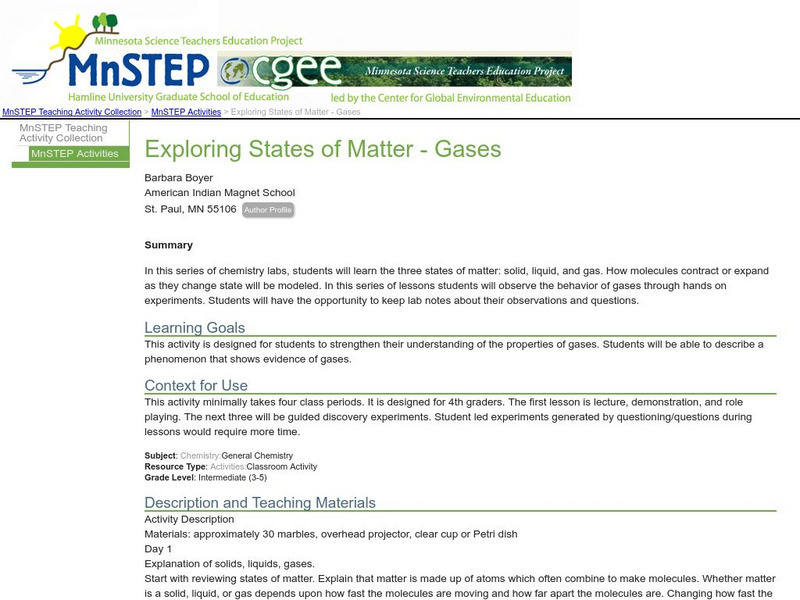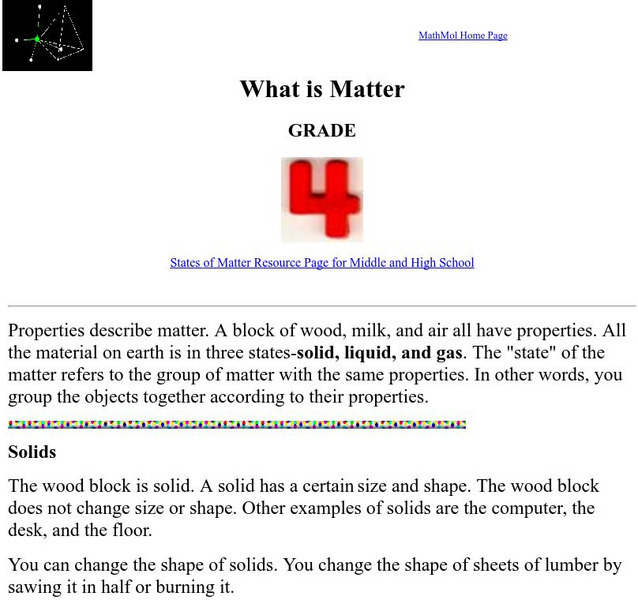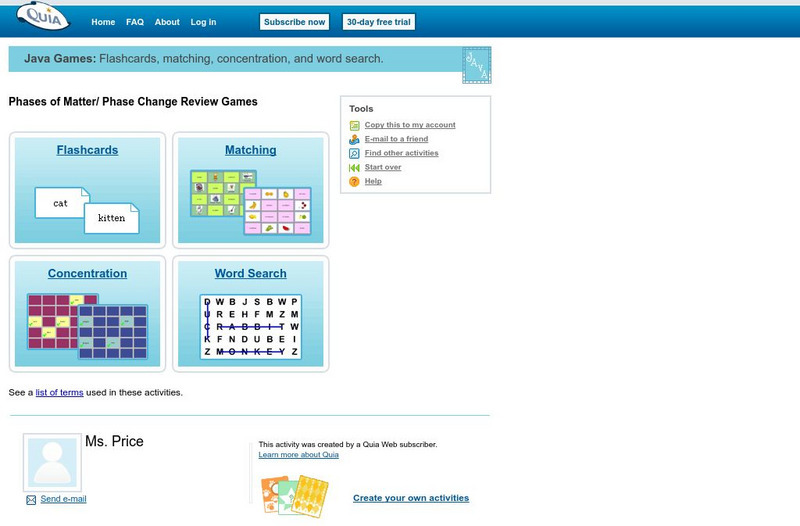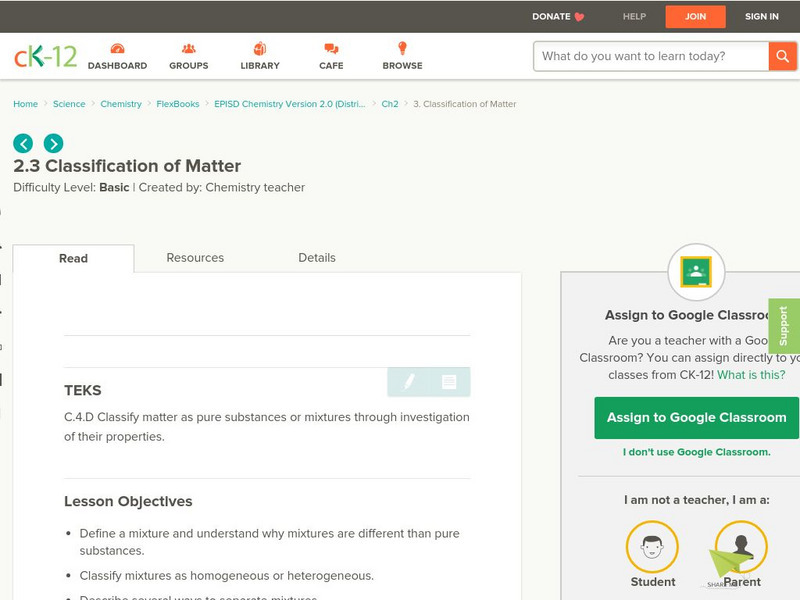Hi, what do you want to do?
Other
Science4 Us: Changes in Matter
Through an instructional video, games, and activities, students explore three types of change matter makes: physical change, in which only the shape of the matter changes; physical phase change in which matter changes to a different form...
OpenStax
Open Stax: College Physics: Phase Changes
Learn about the phases of matter in this section of a college textbook. Section defines the phases of matter and discusses how to interpret a phase diagram. Also explored is partial pressures and Dalton's Law. Section also includes...
Texas Instruments
Texas Instruments: Who Says a Watched Pot Never Boils?
In this activity, students' will investigate what causes phase changes in matter.They use a temperature sensor to measure the temperature of a substance and identify visual clues to the phase changes.
University of Colorado
University of Colorado: Ph Et Interactive Simulations: States of Matter
Watch different types of molecules form a solid, liquid, or gas. Add or remove heat and watch the phase change. Change the temperature or volume of a container and see a pressure-temperature diagram respond in real time. Relate the...
Concord Consortium
Concord Consortium: Stem Resources: States of Matter
Using simulations observe what solids, liquids, and gases look like at the atomic scale. After observing the different states of matter at their atomic level, students will be able to conclude about the forces and attractions that exist...
Chem Tutor
Chem Tutor: Chemistry: States of Matter
This lesson focuses on the states of matter: solids, liquids, and gases. It also discusses the Kinetic Theory of Matter, Thermodynamics, Triple point, Phase Change Graphs and the Heating Curve of Water. It provideds adrawing of a heating...
Science Education Resource Center at Carleton College
Serc: Exploring States of Matter Gases
In this series of chemistry labs, students learn about the three states of matter by observing how molecules contract or expand as they change state.
University Corporation for Atmospheric Research
Ucar: Just a Phase: Water as a Solid, Liquid, and Gas
This site helps students construct a model of the arrangement of water molecules when present as solid, liquid or gas. Includes background information, lesson plans, links to standards and assessment ideas.
New York University
New York University: What Is Matter?
At this resource discover the difference between solids, liquids, and gases. Practice what you just learned with included review questions.
Florida State University
Florida State University: Intermolecular Forces: Changes of State
Discusses the changes of state that can occur for the three different types of matter (solids, liquids, and gases) and different types of heat energy that have been defined by scientists.
Quia
Quia: Phases of Matter
Four activities for reviewing vocabulary and definitions related to changes in states of matter.
CK-12 Foundation
Ck 12: Classification of Matter
[Free Registration/Login may be required to access all resource tools.] In this online tutorial students will define a mixture and understand why mixtures are different than pure substances. They will classify mixtures as homogeneous or...
Purdue University
Purdue Univ: Gases, Liquids, and Solids
This site has a brief description of the differences in particles in a gas, liquid, and solid. Animated microscopic pictures demonstrate the molecular movement in each state. Information is then summarized in an easy-to-read chart.
Museum of Science
The Atom's Family: Phases of Matter
Help the Phantom choose a material and observe the changes at different temperatures in the molecule chamber. What happens to the elements or molecules as the temperature changes?
New York University
New York University: States of Water
Use this resource to learn about the three different phases of water; solid, liquid, and gas. What happens to water as it changes into a solid or gas? Includes short and easy to do activity.
Other
Science Alive: Melting Point Simulation
Percy Julian and Josef Pikl used the fact that melting point-the temperature at which a substance changes from a solid to a liquid-is a characteristic property of a substance to prove that the British chemist Robert Robinson could not...






